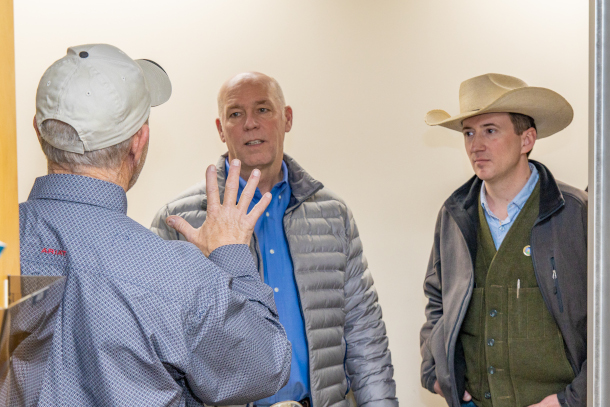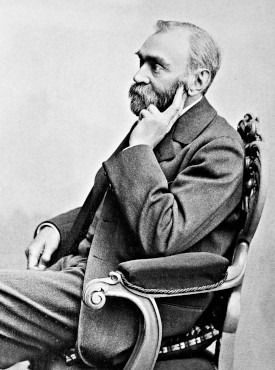Beyond the Headlines
Air Date: Week of May 26, 2023

Montana Governor Greg Gianforte (center) has signed a bill considered by many critics to be one of the worst anti-climate laws in the country. (Photo: USDA, Wikimedia Commons, Public Domain)
This week, Living on Earth Contributor Peter Dykstra joins Host Steve Curwood to talk about Montana’s new law that blocks climate concerns from permitting decisions. Also, Bisphenol A or BPA is linked to cancer, obesity, and diabetes. Now private researchers say significant levels of BPA can be found in some sports bras and other athletic clothing. And in history, they look back to the creation of the Nobel Prizes.
Transcript
DOERING: It’s Living on Earth, I’m Jenni Doering.
CURWOOD: And I’m Steve Curwood. On the line with me now from Atlanta, Georgia is Living on Earth contributor Peter Dykstra. Hey there Peter, what you got?
DYKSTRA: Hi, Steve. You know, we look all the time in the news at some of that screwy stuff that goes on in Washington DC, with Congress and with federal laws, but if you ever want a break from what's screwy in Washington, sometimes look at screwy state legislatures. Up in Montana, legislators in a Republican-dominated body have passed a law that bars state agencies from considering climate change when issuing permits for large projects. It's almost the equivalent of Florida's "Don't Say Gay" law for the climate.
CURWOOD: Wait, what you're telling me is that in Montana, now, they've enacted this law that says, oh, if you're gonna be building out any coal or oil or gas infrastructure, you cannot calculate any impact on climate disruption?
DYKSTRA: That’s pretty much it and Montana has bought in pretty big on the fossil fuel side of the agenda. The eastern part of the state includes a big part of the Bakken Formation that dominates the economy and environment in North Dakota. It's one of the largest oil and gas fields in the United States. And much of Montana-bordering Wyoming also includes major coal fields as well. When Governor Greg Gianforte signed the bill, he furthered a climate, no pun intended, of denial. If you don't mention climate change, it's all going to go away simply by banging the gavel and signing it with Governor Gianforte's signature.
CURWOOD: All right, Peter, what else is going on?

A nonprofit called the Center for Environmental Health has warned manufacturers of athletic clothing like sports bras, leggings, and shirts that their products have been shown to contain BPA. (Photo: Clique Images, Unsplash)
DYKSTRA: A nonprofit group called the Center for Environmental Health, sent notices to some of the biggest manufacturers of leggings, sports, bras, shorts, athletic shirts. It says that growing numbers of athletic clothing have high levels of BPA, considered to be a fairly dangerous group of chemicals. Their testing showed that the clothing could expose wearers to up to 40 times the safe limit of BPA, based on California's tight standards. BPA has been linked to everything from obesity, to cancer, to diabetes, to heart problems.
CURWOOD: Now that's not a government agency. What exactly did they do?
DYKSTRA: They haven't issued a new report per se. But based on their testing, they wanted to let these companies know that they could be in legal jeopardy if the BPA levels in these sporting apparel products is as dangerous as it appeared to be when they took their tests. BPA came into popularity as a plastic softener. And that's how it got used in things like baby bottles. It was outlawed in things like plastic bottles for kids. Now, here's another level of concern.
CURWOOD: Yeah. And how ironic is this that somebody wearing workout gear presumably to get in better shape could be wearing a garment that actually could make them fatter or make them sick?
DYKSTRA: Oh, wanting to improve your health could be hazardous to your health?
CURWOOD: I wish it were funny, but it isn't, is it? Hey, what do you have from the annals of history for us today?
DYKSTRA: 125 years ago, May 29, 1898, a dispute over the will of the late Alfred Nobel is settled by his family members. Nobel invented dynamite and he made a fortune and wanted to leave that fortune, in part, presumably out of guilt for inventing dynamite to the creation of prizes that would celebrate the betterment of humankind. And to this day, we mark not only the Peace Prize, but other Prizes in economics, literature, chemistry, physics, medicine, and they're still pretty pricey prizes and certainly prestigious ones.

Alfred Nobel dedicated much of his fortune to establishing the Nobel Prizes. (Photo: Gösta Florman, The Royal Library of Sweden, Wikimedia Commons, Public Domain)
CURWOOD: And a number of interesting folks have won these over the years. Peter.
DYKSTRA: That’s right, former Vice President Al Gore being one of them. He shared the prize with the scientists of the Intergovernmental Panel on Climate Change. There are others like the chemists who discovered the ozone hole over the South Pole and the North Pole, and others throughout the years that have advocated both on the political and the scientific end to better protect our climate.
CURWOOD: Well, I'm thinking of Wangari Maathai, of course from East Africa, who you know, showed us the way towards protecting the planet by protecting our trees. Hey, Peter Dykstra is a contributor to Living on Earth. We'll talk to you again real soon, Peter.
DYKSTRA: All right, Steve. Thanks a lot and we'll talk to you soon.
CURWOOD: And there's more on these stories on the Living on Earth webpage. That's LOE.org.
Links
Inside Climate News | “Montana’s New Anti-Climate Law May Be the Most Aggressive in the Nation”
Living on Earth wants to hear from you!
Living on Earth
62 Calef Highway, Suite 212
Lee, NH 03861
Telephone: 617-287-4121
E-mail: comments@loe.org
Newsletter [Click here]
Donate to Living on Earth!
Living on Earth is an independent media program and relies entirely on contributions from listeners and institutions supporting public service. Please donate now to preserve an independent environmental voice.
NewsletterLiving on Earth offers a weekly delivery of the show's rundown to your mailbox. Sign up for our newsletter today!
 Sailors For The Sea: Be the change you want to sea.
Sailors For The Sea: Be the change you want to sea.
 The Grantham Foundation for the Protection of the Environment: Committed to protecting and improving the health of the global environment.
The Grantham Foundation for the Protection of the Environment: Committed to protecting and improving the health of the global environment.
 Contribute to Living on Earth and receive, as our gift to you, an archival print of one of Mark Seth Lender's extraordinary wildlife photographs. Follow the link to see Mark's current collection of photographs.
Contribute to Living on Earth and receive, as our gift to you, an archival print of one of Mark Seth Lender's extraordinary wildlife photographs. Follow the link to see Mark's current collection of photographs.
 Buy a signed copy of Mark Seth Lender's book Smeagull the Seagull & support Living on Earth
Buy a signed copy of Mark Seth Lender's book Smeagull the Seagull & support Living on Earth

